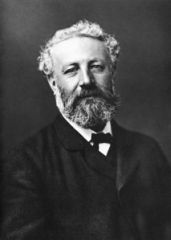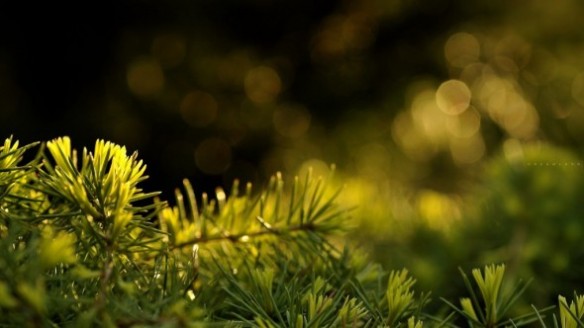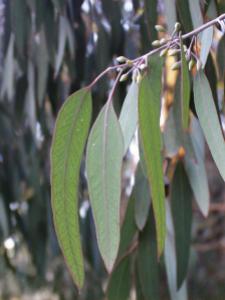Jules Verne was one of the fathers of science fiction, and the author of such famous adventure novels as 20,000 Leagues Under the Sea, Journey to the Centre of the Earth. Verne was a fascinating figure who was born in 1828, and his life is the source of inspiration for an aromatic, citric, woody eau de parfum from Histoires de Parfums which uses that date as its name. With 1828, Gérald Ghislain sought to create a scent for the modern globe-trotter who wants to travel in Jules Verne’s olfactory footsteps.
Histoires de Parfums describes 1828 and the man whom it seeks to encapsulate as follows:
He was born in Nantes, at the beginning of that century of discoveries. The close ocean took him far away, inspiring in him extraordinary novels of adventure. Inspired by the father of literary science fiction, this eau de parfum for modern globe-trotters breathes its aromatic Hesperides-like scents, just as a marine breeze over a wild heath. A freshness tinted with sophistication.
Originality: spices, wood, aromatic herbs representing Jules Verne – world traveler. A group of olfactive scents assembled from trips all around the globe.
(Madagascar black pepper, Indonesian nutmeg…)
Moods: energizing, dazzling, bright, timeless.Top Note: Grapefruit, Citrus, Tangerine, Eucalyptus
Heart Note: Nutmeg, Pepper
Base Note: Cedar, Incense, Vetiver, Pine cone
1828 Jules Verne opens on my skin with a strong burst of bitter nutmeg, followed by tart grapefruit, sweet tangerine, and zesty citruses. A brief hint of sourness vies with the pungency of the spices, though the sweet and fresh notes try to counter it. Touches of pepper and a fresh, mineralized vetiver ensue, briefly creating a small resemblance to a Terre d’Hermes-like cologne. As a whole, 1828’s opening feels like a very safe, more elevated version of a department store fragrance. I’m thoroughly unimpressed, and starting to reconsider my plan of going through a number of the Histoires de Parfum creations in a row.
Although the dominant bouquet is of nutmeg with hesperidic, citric elements, 1828 starts to change after 5 minutes. The tiniest whisper of eucalyptus, pine and incense slowly start to creep in. At first, they sit quietly on the sidelines, and overlook the flickers of clean musk and vanillic sweetness that stir deep down in the base. However, after 15 minutes, the pine and eucalyptus amble onto center stage, adding a very forest-like aroma to the nutmeg citrus bouquet. At the same time, the vetiver recedes to the background, while both the incense and tangerine fade away completely.
For the rest of the hour, 1828 is a blend of dusty, bitter nutmeg, white-yellow grapefruit, pine cones, and eucalyptus. The latter smells like the aromatic oil you get if you crumple the fresh leaves between your fingers. The pine smells similarly deep, but it’s more woody than resinous in nature on my skin. Citrus, woody scents aren’t particularly me, but 1828 underwhelms me for different reasons. It feels rather boring, but, more to the point, the elements seem to be very much out of balance on my skin. Someone on Fragrantica once described 1828 as the scent of curdled nutmeg, and, oddly enough, that description really seems to fit the opening hour.
Thankfully, 1828 Jules Verne improves with time, although the scent also turns more simplistic and minimalistic. At the end of the 1st hour, a wonderful creaminess arrives, shoots through all the notes, and smooths out the rough edges. It’s like a silky cream that is almost vaguely vanillic in nature, which is a little baffling as vanilla is not listed in the notes. The accord turns 1828 into a fragrance that is smoother, more balanced, and less crisp. The pine and eucalyptus notes are now more prominent than the nutmeg on my skin, yet the fragrance feels warmer as a whole.
1828’s sillage is very soft, though, and the scent hovers only an inch above the skin. A lot of the notes begin to overlap each other, losing clear shape and distinction. In fact, from afar, 1828 appears like a well-blended blur of creamy, aromatic, foresty woods, that are lightly flecked by an amorphous, zesty citrus, a subtle dash of sweetness, and a touch of spiciness. Up close, 1828 isn’t substantially more complex or nuanced, though you can pull out the individual notes with more ease.
1828 remains that way for hours. It turns into a skin scent just before the end of the 2nd hour, and grows increasingly abstract. At the 3.5 hour mark, it is an aromatic, woody bouquet dominated by pine with only small touches of grapefruit and eucalyptus, all atop a creamy base. There is now a small vein of cedar running through 1828 as well, though it’s very muted on my skin. However, the nutmeg has disappeared, and two hours later, so does that last remaining citrus element.
By the end of the 5th hour, 1828 Jules Verne is a blurry haze of creamy, vaguely aromatic, green woods. The pine note has vanished, and the cedar is just barely discernible if you put your nose right on your skin, inhale forcefully, and focus hard. By the start of the 7th hour, even that goes away. In its final moments, 1828 is a wisp of abstract creamy woodiness. All in all, the fragrance lasted just short of 9 hours on me, with generally low sillage throughout.
After its unbalanced, somewhat bitter start, 1828 turned into a generally pleasant fragrance. I preferred the bouquet in the middle phase with its mix of foresty woods and creamy sweetness, lightly flecked with that pretty grapefruit, but all of it left me feeling underwhelmed. None of it is distinctive or particularly interesting, in my opinion. For the most part, 1828 really feels like a more refined version of a designer scent, minus the latter’s synthetics or cheap ingredients. In fact, I’m pretty sure I’ve smelled 1828’s drydown somewhere else before, but I can’t remember which department store fragrance it was.
Still, 1828 is pleasant, even if that’s damning it with faint praise. On a more positive note, it’s definitely an easy, safe, approachable fragrance. I just wish I wasn’t so utterly bored. Surely Jules Verne of all people deserved something more interesting? A breath of saltiness, a touch of algae, or a whisper of … something…. that is unique, complex, and enlivening?
On Fragrantica, the most amusing review comes from “Cloyd42” who writes:
If nutmeg could curdle it would smell like this. The grapefruit is downright sugary and the eucalyptus is wildly unbalanced. If 1828 really smelled like this it must have been a dreary year indeed.
Sillage / 3 ft
Duration / eternal?
Fabulosity / day old sushi
Value to price ratio / poor
2/10
Speaking of his sillage and duration numbers, I want to make clear that my experience with 1828 as a weak scent doesn’t seem to be the norm. However, I fit squarely with others in terms of the longevity. The votes for both areas are:
- Sillage: 7 for soft, 11 for moderate, 13 for heavy, and 10 for enormous;
- Longevity: 13 for long lasting (7-12 hours), and 14 for Very Long Lasting (12+hr). [I’ve skipped over the other categories as those 2 are the majority by a landslide.]
Those two issues aside, Fragrantica posters are mixed in their views of 1828. A number of people find it to be an easy-going, refined spring scent, while others shrug and dismiss it as largely forgettable despite its pleasant nature. A small range of opinions:
- Honestly, the most disappointing scent among HdP masculines. […] this is undoubtably well made, but also a bit boring and forgettable. You can get the same job done by other cheaper fragrances!
- Simple, easy to like and also easy to forget… [¶] But it is quite good. [¶] I really enjoy how the nutmeg is well blended with the other notes as citrusy accords (on the beginning), the pine notes, eucalyptus and cedarwood. [¶] Nutmeg is the main note for me… Dusty, spicy and intriguing here. [¶] But even though, here we have a simple scent – easy to go everywhere, anywhere…
- This is a terrrific blend of various scents of woods and citrus, especially the great pine scent that comes from it. [¶] I have never heard more compliments during the day at the office from a fragrance than with this.
 One commentator, “Alfarom,” found 1828 Jules Verne to be extremely similar to Gucci Envy for Men:
One commentator, “Alfarom,” found 1828 Jules Verne to be extremely similar to Gucci Envy for Men:
to me, 1828 is not so distant from Gucci Envy for Men.
It opens with citruses and eucalyptus immediately joined by incense. Frankincense perfectly blends with the aromatic grapefruit note adding depth and consistency to the fragrance. This accord is definitely successful and so well executed that I was ready to declare 1828 as one of my favourite compositions from this house. Elegant, masculine, fresh but not dull, with a remarkable presence but not loud…a fantastic everyday’s fragrance…but…
…but disappointment was waiting for me just right behind the corner. The eucalyptus note evaporates in couple of minutes and you can say goodbye to the “balsamic” effect. Same is for the aromatic grapefruit leaving 1828 in a sort of generic territory made of vetiver, spices and woods (mainly cedar) that’s really too similar to Gucci Envy For Men. Overall I can’t say that 1828 is unsuccessful but after the outstanding opening I definitely expected something more.
That said, if you’re not familiar with Gucci Envy For Men and you are ready for a challenging price tag, you could enjoy 1828. Personally I stick with the Gucci.
All I can say is that he experienced a scent that was substantially more complex than I did, and, yet, he still found it comparable to a department store fragrance.
I could comb the web for more comparative reviews to give to you, but, honestly, I lack the motivation. Cloyd42 wrote in his Fragrantica review, “If 1828 really smelled like this it must have been a dreary year indeed.” I would replace the word “dreary” with “uninspiring,” which is the very last thing that a man like Jules Verne deserves.








